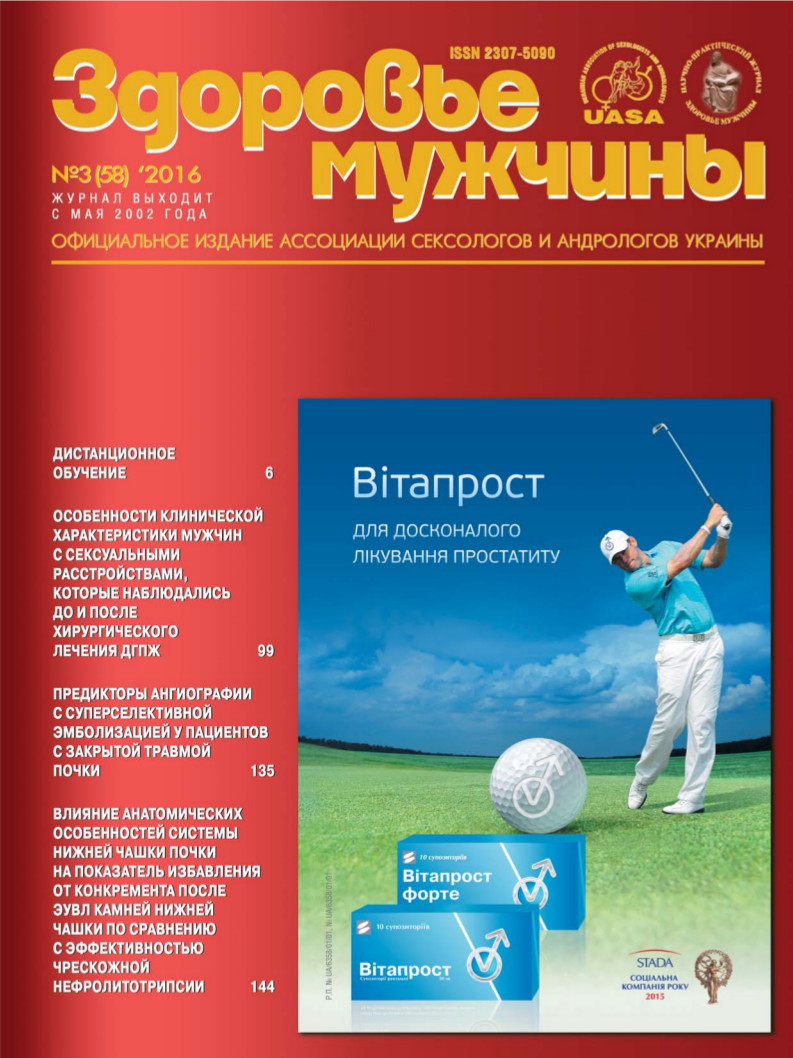Dynamics of indicators of early and late results of radical cystectomy depending on the time of the surgery from 2005 to 2016
##plugins.themes.bootstrap3.article.main##
Abstract
The aim of the study: was to identify the risk factors for post-surgical complications in patients who underwent radical cystectomy (RCE).
Material and methods. We studied the immediate and long-term results of RCE due to bladder cancer (BC) (n=122). A retrospective analysis of the main indicators of the pre- and postoperative periods was done in chronological order, for all patients, including patients with non-cancer pathologies (n = 4).
Results. In 91% of patients RCE was performed for locally advanced and metastatic bladder cancer with more than 50% of patients having a comorbidity index of Charlson>4. Comorbidity Index showed a trend towards statistical significance, affecting the severity of post-surgical complications (r = 0, 14; p <0, 05). Postoperative complications were observed on average in 35% of patients. With the development of diagnostic capabilities and a more careful selection of patients as well as the improvement of surgical technologies, the level of post-surgical complications decreased from 78.3% in 2005 to 29.1% in 2015. External urinary diversion with continent stoma formation showed lower as compared to other methods derivation functional results, as evidenced by the presence of a weak direct correlation between continent diversion and presence of post-surgical complications.
The degree of severity of complications has significant correlation with surgical experience. Increase in the duration of the surgery, and large amounts of blood loss, along with the type of urine diversion and experience of the surgeon performing RCE, were significant predictors of complications, which was confirmed by monovariant logistical regression.
Conclusions. The correlational analysis showed deterioration tendency of post-surgical outcomes in patients who have three or more correlated pathologies, which increases the 10 year risk of death up to 44%, even without cancer-specific survival. Risk factors for post-surgical morbidity and poor prognosis of survival after RCE are heterotopic derivation, intraoperative blood loss of more than 1,000 ml, as well as the lack of experience of the surgeon.
##plugins.themes.bootstrap3.article.details##

This work is licensed under a Creative Commons Attribution 4.0 International License.
Authors retain the copyright and grant the journal the first publication of original scientific articles under the Creative Commons Attribution 4.0 International License, which allows others to distribute work with acknowledgment of authorship and first publication in this journal.
References
Muscle-invasive and Metastatic Bladder Cancer [электронный ресурс] //URL: http://uroweb.org/guideline/bladder-cancer-muscle-invasive-and-metastatic/ #3 (Дата обращения 18.09.2106).
Бюлетень Національного канцер-реєстру. – No 17. «Рак в Україні, 2014-2015». – С.13-61.
Huang G.J., Stein J.P. Open radical cystectomy with lymphadenectomy remains the treatment of choice for invasive bladder cancer // Curr Opin Urol. – 2007;17:369-375.
Stein J.P., Lieskovsky G., Cote R. et al. Radical cystectomy in the treatment of invasive bladder cancer: long-term results in 1,054 patients // J Clin Oncol. – 2001;19:666-675.
Chang S.S., Cookson M.S., Baumgartner R.G. et al. Analysis of early complications after radical cystectomy: results of a collaborative care pathway // J Urol. – 2002; 167: 2012-2016.
Novara G., De Marco V., Aragona M., et al. Complications and mortality after radical cystectomy for bladder transitional cell cancer // J Urol. – 2009;182:914-921.
Возианов С. А., Шамраев С.Н., Васильева В.Д. Радикальное оперативное лечение мышечно-инвазивного рака мочевого пузыря // Урологія. – 2016. – No2. – С. 64-66.
Surgical complications.info: Department of Surgery, University Hospital Zurich, Switzerland 2008-2009.http://www.surgicalcomplication.info/index-2.html.: 25.10.2015.
TNM classification of malignant tumours, 7 edition / Ed. by Sobin LH. – UK, 2009. – Р. 262-266.
Witjes J.A., Compérat E., Cowan N.C., et al. EAU guidelines on muscle-invasive and metastatic bladder cancer: summary of the 2013 guidelines // Eur Urol. – 2014;65(4):778-792.
Chang S.S., Hassan J.M., Cookson M.S., et al. Delaying radical cystectomy for muscle invasive bladder cancer results in worse pathological stage // J Urol. – 2003;170(4):1085–1087.
Sanchez-Ortiz R.F., Huang W.C., Mick R., et al. An interval longer than 12 weeks between the diagnosis of muscle invasion and cystectomy is associated with worse outcome in bladder carcinoma // J Urol. – 2003;169(1):110–115.
Bruins, H. M. et al. The impact of the time interval between diagnosis of muscle-invasive bladder cancer on staging and survival: a Netherlands Cancer Registry analysis // Urol Oncol. – 2016;34(4):166.
Extermann M., Overcash J., Lyman G.H., et al. Comorbidity and functional status are independent in older cancer patients // J Clin Oncol. – 1998; 16(4):1587–1597.
Stein J.P., Cai J., Groshen S., Skinner D.G. Risk factors for patients with pelvic lymph node metastases following radical cystectomy with en block pelvic lymphadenectomy: the concept of lymph node density // J. Urol. - 2003. - Vol. 170. - P. 35-41.
Herr H.W. Superiority of ratio based lymph node staging for bladder cancer // J. Urol. - 2003. - Vol.169. - P. 943-945.
Brossner C., Pycha A., Toth A. et al. Does extended lymphadenectomy increase the morbidity of radical cystectomy? // BJU Int. – 2004. – Vol. 93(1). – P. 64-66.
Красный С.А., Суконко О.Г., Ролевич А.И. Результаты лечения больных раком мочевого пузыря с метастазами в регионарных лимфоузлах // Онкоурология. - 2007, No3. – С. 35-41.
Атдуев В.А., Мамедов Х.М., Шутов В.В. и соавт. Анализ факторов, влияющих на развитие осложнений после радикальной цистэктомии // Саратовский научно-медицинский журнал. - 2009, No4. – С. 35-38.
Witjes J.A., Comperat E., Cowan N.C. et al. Muscle-invasive and metastatic bladder cancer // Pocket Guidelines, 2015. – P. 32-46.
Красный С.А., Суконко О.Г., Поляков С.Л., Ролевич А.И. и соавт. Предикторы ранних тяжелых осложнений радикальной цистэктомии // Онкоурология. - 2010, No4. - С. 42-46.
Гуменецкая Ю.В., Попов А.М., Карякин О.Б. Отдаленные результаты органосохраняющего лечения больных мышечно-инвазивным раком мочевого пузыря // Клин. Онкология, 2012. – Спец. выпуск. 80 с.





